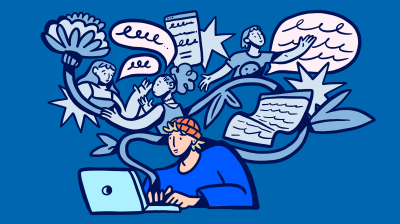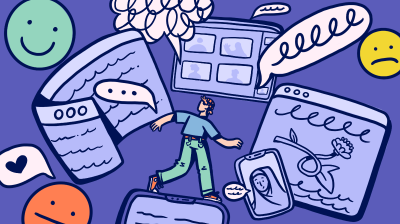Common thought patterns and how they can affect your life
Learn about where your thoughts come from, how they can become biased, and what common thought patterns can impact your mental health and wellbeing.

Thoughts are one of the building blocks that shape how you experience the world. Your thoughts can also influence your emotions and actions. Thoughts help you understand what’s happening around you by interpreting current information from your environment and past information from your memories.
This process isn’t always accurate and our thought patterns are vulnerable to bias. They can distort how we see the world or lead us to believe things that aren’t true. People often make errors when processing information from the world around them and these errors can impact their judgements and decisions. If thinking errors go unchecked, they can make you see reality in a distorted way. Some common biased thought patterns can have a negative effect on mental health. Building awareness of these biased ways of thinking and recognising when you’re engaging in them can help support your mental health and wellbeing.
What is a thought?
A thought is a mental representation of something. Thoughts can come in the form of ideas, memories or images. Some thoughts focus on making judgements about how things are, others focus on predicting what might happen in the future, and others focus on weighing up options or solving problems. Some thoughts are fleeting, but others can be formed into memories if your mind decides that they are important or relevant to your needs. When a thought is repeated and reinforced over time, it can form a belief; something you hold to be true. You won’t always be aware of your thoughts, but they can still have an influence on your actions.
How thoughts can become biased
People use the available information in their environment to generate thoughts that help them understand what’s happening around them. Often, there isn’t enough information in your environment to build a complete picture of what’s happening. In these cases, your thoughts will try to fill in the blanks by making predictions about what might be going on. Your mind uses information from relevant past experiences to help with this process.
Using thoughts to fill in the blanks is something that everyone does. It can be a useful and adaptive process that helps you make more informed decisions. The world is complicated and your mind manages this complexity by taking short-cuts and simplifying the information you’re taking in. It’s important to understand that your mind won’t always get it right when it’s engaging in this process, and your past experience can bias your thinking. When your mind jumps to conclusions quickly, without collecting enough evidence, and without considering alternative explanations, this can distort how you see the world.
How trauma impacts thought patterns
When someone has experienced traumatic events, it can have an impact on their thinking patterns. One of your brain’s key functions is to help keep you safe by spotting potential dangers in your environment. If you have experienced something that was traumatic or posed a threat to your health or wellbeing, your brain might respond to this by becoming more sensitive to perceived potential threats. Think of this process like turning up the sensitivity on a metal detector. Your brain will jump to conclusions, collecting less information before deciding how to act. This allows you to find and respond to potential threats quicker.
For example, if you had been attacked by a dog in the past, and see a dog in the distance when you’re out for a walk, you might jump to the conclusion that the dog is going to bite you. Based on this prediction, you might respond by turning and walking in a different direction. Traumatic experiences can also cause your brain to develop a negative bias, meaning if a situation is ambiguous or unclear, you will be more likely to assume that the situation is negative or threatening. For example, if you had a frightening experience on a night out in the past, you might assume someone approaching you on another night out is dangerous or wants to harm you.
In both of these cases, you haven’t collected enough information to know if your assumptions are definitely true. However, thinking in this way allows you to respond quicker and avoid potential danger. While this process is designed to keep you safe, it comes with side-effects. In reality, lots of the situations you’ll find yourself in won’t be threatening, and these ways of thinking can cause issues in your life long-term. It’s also important to keep in mind that trauma is just one of the things that can cause someone to develop biased thinking, and you can also develop biased thoughts if you haven’t experienced trauma.
How thought patterns impact mental health
While our thoughts can sometimes be biased or inaccurate, this isn’t always an issue. However, there are a collection of biased thought patterns that are problematic and negatively impact your mental health. Psychologists call these thought patterns ‘cognitive distortions.’ These thought patterns cause you to view reality in inaccurate and overly-negative ways. Everyone thinks in these ways from time to time, but when these thought patterns become reinforced over a period of time, they can increase anxiety, lower your mood, cause pressure in your relationships, and lead to other challenges and complications.
Biased thought patterns play a role many different mental health conditions. People often develop these thought patterns as a way of coping with stressful or traumatic experiences. The more prolonged and severe those experiences are, the more likely it is that these thinking patterns will develop.
Thought patterns that can impact your mental health
Below is a list of biased thought patterns that can impact your mental health. Keep in mind that just because someone engages in these ways of thinking, it doesn’t mean that they have a mental health issue. Being able to spot when you’re thinking in these ways is a useful skill for anyone to have. It can help you to break the cycle of biased thinking and help boost your mental wellbeing.
Black-and-white thinking
Black-and-white thinking makes you see the world in extremes. If you try a new task and it doesn’t go as well as you hoped, you might think it’s a total failure. You might think that you are always right or that someone else is always wrong. People engaging in this way of thinking might view people or situations in their life as being either all good or all bad.
Black-and-white thinking is a biased way of seeing the world because it doesn’t recognise how complex life can be. When you believe that something only has two possible sides, you ignore the middle ground.
‘Should’ thoughts
This biased thought pattern can make you set rules in your head for how people ‘should’ or ‘must’ be. Some ‘should’ thoughts relate to yourself. For example, you might think that you should get over 80% on a test to be able to feel good about it. Other ‘should’ thoughts relate to other people. You might think that if your friend cares about you, they should message you every day.
‘Should’ thoughts can cause problems because they create unrealistic expectations. This thought pattern can make you feel frustrated when you can’t do something you think you should be able to do. It can also lead to feelings of guilt and shame. ‘Should’ thoughts can also lead to anger or disappointment when other people don’t conform to your expectations. In reality, however, you can’t control what other people do.
Catastrophising
Catastrophising happens when a person automatically assumes that the situation they are facing will end in the worst possible way. You might think that if your partner doesn’t answer their phone, they’re going to break up with you, that failing an exam means you’ll fail your entire course, or that your pet will die just because they have to go to the vet.
Catastrophising can have a negative impact on your mental health because everyday worries can quickly spiral and cause a lot of anxiety. While some people might think that someone who catastrophises a lot is just over-reacting, it’s important to understand that this way of thinking can be a reaction to experiencing repeated negative or traumatic events.
Mind-reading
This thought pattern can cause you to believe that you know what another person thinks or feels, even when there’s no evidence to support it. If you’re engaging in this way of thinking, you might think that a stranger doesn’t like how you’re dressed because of how they looked at you, or you might think your friend finds you boring because they’re quieter than usual.
Mind-reading can often be confused with empathy. Empathy is your ability to understand how someone might be feeling in a certain situation. Mind-reading is different because it makes you believe you know the other person’s thoughts or intentions with certainty. It doesn’t leave room for alternative explanations of their behaviour.
Fortune-telling
Fortune-telling makes you think that a situation is going to go badly for you before it actually happens. If you’re engaging in this way of thinking, you might assume the tickets for a concert you want to go to will be sold out before you try to buy them, or predict that you won’t like the food at a new restaurant before you go there.
Assuming negative outcomes like this can cause anxiety because you’re worrying about lots of potential situations that may never happen. If you’re expecting a situation to end badly before it’s begun, it can discourage you from trying or make you feel like you can’t influence the outcome.
Overgeneralisation
When you over-generalise, you reach a broad conclusion based on one or two single events. For example, if you’re over-generalising, you might think that you’ll be alone forever because your first relationship ended.
Overgeneralisation can be limiting and act as a barrier in your life. When you have a negative experience with something, it doesn’t mean that you can’t have positive experiences with that thing in the future. Life is usually too complex and ever-changing to make sweeping generalisations.
Ignoring the positive
With this pattern of thinking, a person will ignore the positive parts of a situation and only focus on the negative parts. When you regularly ignore the positive, you may find it difficult to appreciate your successes or the positive things that happen in your life. If you’re thinking in this way, you might ignore all the compliments your boss gives you, but spend a lot of time thinking about the one time they criticised your work. If you do well on an exam, you might explain it away or say it was “just a fluke.”
Discounting the positive can take a toll on your mental health. It can make your situation seem more negative than it actually is, and can lower your mood. It can also have an impact on your self-esteem.
How working with a therapist can help
Thought patterns can be hard to recognise if you don’t know what to look for. Many occur automatically so you might not be aware you’re having them. They can also be so reinforced that you might not realise you have the power to change them and believe that’s just the way things are. If you recognise that you’re engaging in some of these biased thought patterns and they’re having an impact on your mental health, it can be challenging to change them on your own. Professionals who are trained in evidence-based therapies like Cognitive behavioural therapy (CBT) can help you change biased thinking patterns through a process called ‘cognitive restructuring.’ By working with a therapist, you can explore how different thinking patterns are helping or hindering you and reframe problematic thought patterns in safe and structured ways.
There are many different types of evidence-based talk therapy, and what works well for someone else might not be the best approach for you. If you are thinking about starting therapy to help with your thinking patterns, explore the different types of therapy that are available to you and don’t be discouraged if your first experience isn’t the best fit. Therapy is a very personal thing, and it can take time to find the right therapy for you.
Feeling overwhelmed and want to talk to someone?
- Get anonymous support 24/7 with our text message support service
- Connect with a trained volunteer who will listen to you, and help you to move forward feeling better
- Whatsapp us now or free-text SPUNOUT to 50808 to begin.
- Find out more about our text message support service
If you are a customer of the 48 or An Post network or cannot get through using the ‘50808’ short code please text HELLO to 086 1800 280 (standard message rates may apply). Some smaller networks do not support short codes like ‘50808’.






